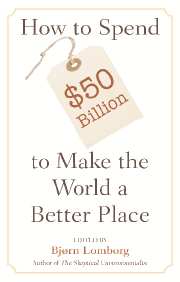Book contents
- Frontmatter
- Contents
- Contributors
- Introduction
- 1 Meeting the Challenge of Global Warming
- CLIMATE CHANGE – OPPONENTS' VIEWS
- 2 Communicable Diseases
- COMMUNICABLE DISEASES – OPPONENTS' VIEWS
- 3 The Challenge of Reducing the Global Incidence of Civil War
- THE CHALLENGE OF CONFLICTS – OPPONENTS' VIEWS
- 4 Toward a New Consensus for Addressing the Global Challenge of the Lack of Education
- THE CHALLENGE OF LACK OF EDUCATION – OPPONENTS' VIEWS
- 5 The Challenge of Poor Governance and Corruption
- THE CHALLENGE OF POOR GOVERNANCE AND CORRUPTION – OPPONENTS' VIEWS
- 6 Hunger and Malnutrition
- HUNGER AND MALNUTRITION – OPPONENTS' VIEWS
- 7 Population and Migration
- POPULATION: MIGRATION – OPPONENTS' VIEWS
- 8 The Water Challenge
- THE WATER CHALLENGE – OPPONENTS' VIEWS
- 9 Subsidies and Trade Barriers
- SUBSIDIES AND TRADE BARRIERS – OPPONENTS' VIEWS
- Expert Panel Ranking
- Index
HUNGER AND MALNUTRITION – OPPONENTS' VIEWS
Published online by Cambridge University Press: 27 July 2009
- Frontmatter
- Contents
- Contributors
- Introduction
- 1 Meeting the Challenge of Global Warming
- CLIMATE CHANGE – OPPONENTS' VIEWS
- 2 Communicable Diseases
- COMMUNICABLE DISEASES – OPPONENTS' VIEWS
- 3 The Challenge of Reducing the Global Incidence of Civil War
- THE CHALLENGE OF CONFLICTS – OPPONENTS' VIEWS
- 4 Toward a New Consensus for Addressing the Global Challenge of the Lack of Education
- THE CHALLENGE OF LACK OF EDUCATION – OPPONENTS' VIEWS
- 5 The Challenge of Poor Governance and Corruption
- THE CHALLENGE OF POOR GOVERNANCE AND CORRUPTION – OPPONENTS' VIEWS
- 6 Hunger and Malnutrition
- HUNGER AND MALNUTRITION – OPPONENTS' VIEWS
- 7 Population and Migration
- POPULATION: MIGRATION – OPPONENTS' VIEWS
- 8 The Water Challenge
- THE WATER CHALLENGE – OPPONENTS' VIEWS
- 9 Subsidies and Trade Barriers
- SUBSIDIES AND TRADE BARRIERS – OPPONENTS' VIEWS
- Expert Panel Ranking
- Index
Summary
The two opponent papers on hunger and malnutrition do not question the basic analysis and opportunities proposed by Behrman, Alderman and Hoddinott in their challenge paper. Instead, in rather different ways, they provide more discussion and insights to support the case for tackling this challenge.
Simon Appleton believes that Berhman et al have made a very thorough and rigorous assessment of the problem and proposed some important policy opportunities. While acknowledging that it is a very broad issue, what he sees missing in the paper is some discussion of how to reduce poverty, which is intimately associated with malnutrition. He also notes that famine is not dealt with, and wonders whether famine relief might not be the basis for a fifth opportunity.
Appleton suggests that the challenge paper authors may have underestimated the benefits of reducing hunger, first by only considering the direct costs of malnutrition and second by not including non-nutritional benefits (e.g., increased welfare of mothers treated to reduce the incidence of Low Birth Weight). However, Behrman et al were asked to address a very specific topic, and were probably quite justified in trying to keep a narrow focus.
Another criticism is that no weighting is given to where the benefits are received: In general, a given benefit will have a greater impact on those most in need. Taking this into account, the third opportunity – micronutrient supplementation – should be given a higher priority because vitamin and mineral deficiencies are concentrated in the poorest sections of society.
- Type
- Chapter
- Information
- How to Spend $50 Billion to Make the World a Better Place , pp. 108 - 112Publisher: Cambridge University PressPrint publication year: 2006



